TLDR Robotic hair transplantation surgery is generally effective with high satisfaction rates and minimal complications.
Between July 2008 and June 2009, a study involving 60 patients aged 18-58 years was conducted to assess the efficacy of robotic hair transplantation surgery. The patients underwent 5-6 hour procedures, receiving 1500-2000 follicular unit grafts under local anesthesia and were discharged the same day. The study reported high satisfaction rates, with 42 patients experiencing excellent results, 7 good, 3 poor, 4 failures, and 4 lost to follow-up. Satisfaction was based on the percentage of graft take up, with over 90% being excellent. Complications were minimal but included pain, paresthesia, infection, hypertrophic scars, and psychiatric issues. The study highlighted the necessity of careful patient selection, counseling, and postoperative care in achieving successful outcomes in hair transplantation.
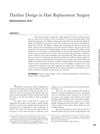 25 citations
,
November 2008 in “Facial Plastic Surgery”
25 citations
,
November 2008 in “Facial Plastic Surgery” Dr. Michael Beehner recommends a personalized, careful approach to hairline design in hair replacement surgery for a natural look.
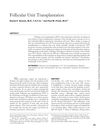 28 citations
,
November 2008 in “Facial Plastic Surgery”
28 citations
,
November 2008 in “Facial Plastic Surgery” Follicular Unit Transplantation (FUT) can give great results and patient satisfaction when done carefully and by a skilled surgeon.
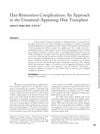 15 citations
,
November 2008 in “Facial Plastic Surgery”
15 citations
,
November 2008 in “Facial Plastic Surgery” Hair restoration can sometimes result in unnatural-looking hair, wide scars, and poorly designed hairlines, but these issues can be corrected with careful planning, various techniques, and possibly medical therapy.
172 citations
,
December 1994 in “The Journal of Dermatologic Surgery and Oncology” This hair transplant method improves cosmetic results for hair loss.
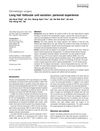 1 citations
,
May 2021 in “International Journal of Dermatology”
1 citations
,
May 2021 in “International Journal of Dermatology” Long hair follicular unit excision is effective for hair transplants, providing quick, natural-looking results with less pain but needs more time, staff, and skill.
4 citations
,
November 2020 in “Journal of Craniofacial Surgery” Scalp Micropigmentation is an effective and safe option for hair restoration and camouflaging scalp scars.
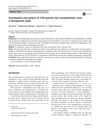 1 citations
,
October 2018 in “European Journal of Plastic Surgery”
1 citations
,
October 2018 in “European Journal of Plastic Surgery” The study found that hair transplant complications are rare, with swelling being the most common issue.
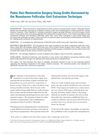 February 2018 in “Dermatologic Surgery”
February 2018 in “Dermatologic Surgery” Nonshaven follicular unit extraction is a highly satisfactory method for restoring pubic hair.
July 2013 in “International Journal of Dermatology and Venereology” The ZMY-1 system makes hair transplants faster without losing safety or effectiveness.






